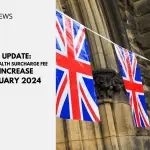How to apply for a British passport after Indefinite Leave to Remain
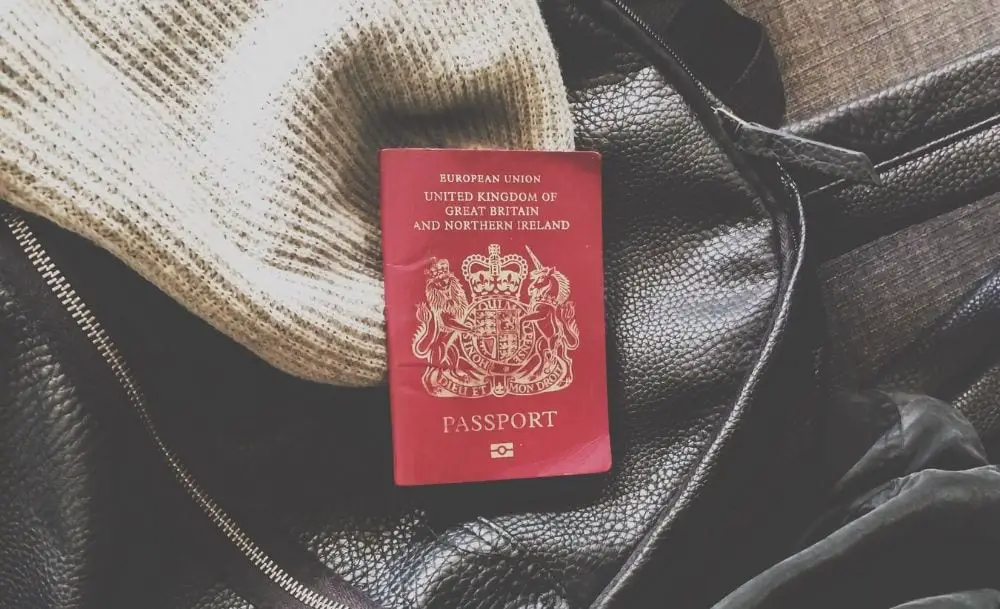
[su_spoiler title=”Contents in this Article” style=”fancy” icon=”plus-circle” anchor=”#Contents”]
- What is Citizenship?
- How Does One Qualify for British Citizenship?
- Applying for British Citizenship After Indefinite Leave to Remain
- Applying for Your Children
- What is the Process of Applying for British Citizenship?
- Applying for a British Passport After Indefinite Leave to Remain
- Getting Your British Passport After Indefinite Leave to Remain
- British Citizenship FAQs
[/su_spoiler]
A step-by-step guide to applying for British citizenship and a passport after getting permanent residency
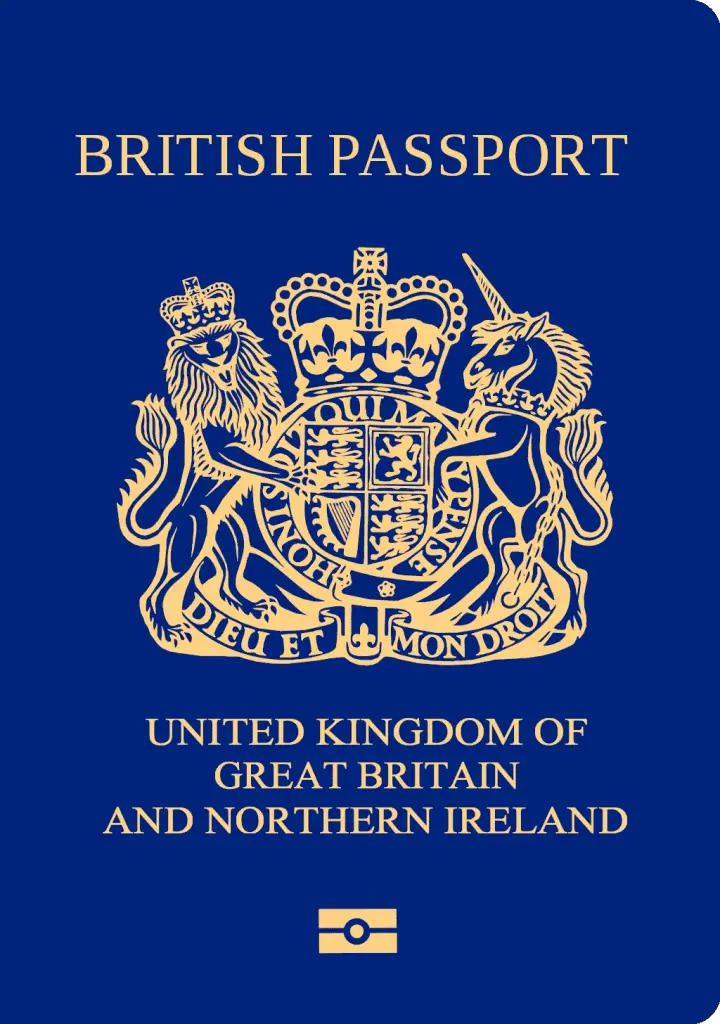
The UK Passport is ranked number 5 in the passport index of most powerful passports. This index is ranked by the number of countries you can travel to without the need for a visa or that you will be granted a visa on arrival. Although this British passport has dropped in rankings since Brexit, it is expected to rise again to a top 3 once arrangements are put in place post-Brexit.
If you are living in the UK and you have already gained Indefinite Leave to Remain (ILR), the next thing you should do is to apply for British citizenship and get a British passport. Why? Even though with ILR you have almost all rights you need to live in the UK, obtaining British citizenship will give you the right to permanently live in the UK without any immigration restrictions.
Then, you will be able to apply for a British passport and to travel to 184 countries and territories with visa-free or visa-on-arrival access.
“Did you know that even if you have indefinite leave to remain, shall you leave the UK for two or more years, you could lose that ILR and when you enter the UK, you could be turned away or allowed to enter only as a visitor?”
Depending on your immigration background or nationality, there are several steps you need to take to get British citizenship first and then to apply for a UK passport.
You will be surprised at the number of times that people ask if they can get a British passport, or any other passport when they are not yet a citizen of that country.

What is Citizenship?
Citizenship is the status of a person recognised by the custom or law of the country that grants that person (called a citizen) the rights and duties of citizenship.
By having citizenship, you are becoming a member of that country, (like joining a club… but only it's a country) which gives you certain rights and privileges, but also requires you to fulfil duties and responsibilities defined by country’s authorities.
A person can become a citizen of the country in several ways:
- most often it is gained automatically through birth, and in all other cases;
- an application process is required.
- There are also some circumstances, regulated in law, which even if you were not born British, you can automatically become a British citizen. An example is if, as a child, you are legally adopted by a British citizen.
In the UK, citizenship is the next step for you if you have already gained Indefinite Leave to Remain (ILR). Obtaining UK citizenship allows you to live in the UK permanently without restrictions, but also it gives you additional rights such as the right to vote, to hold a British passport and the ability to leave the country for an unlimited period of time whilst retaining citizenship.
Yes, you’ve guessed it:
“British Citizenship and a British Passport does not expire if you leave the country for two or more years”
You just need to renew your British Passport when it is expiring and want to travel.
The first step to applying for a British passport is by having British Citizenship.
In the last recorded year of 2017 to the 3rd quarter of 2018, there were 149,583 applications for British Citizenship and a refusal rate of 6%, which is lower refusal rate than the previous years.
India 🇮🇳 , Pakistan 🇵🇰 top the list of nationals becoming British citizens at 1 & 2. With South Africa 🇿🇦 (11), USA 🇺🇸 (13), Philippines 🇵🇭 (16), China 🇨🇳 (19) and Russia 🇷🇺 trailing at 27th.
More people make applications to become a British citizen based upon their residency in the UK, followed by Registration and then by the basis of their marriage or relationship to a British Citizen. In addition to this, every year, on average, more women become British citizens than men.
How Does One Qualify for British Citizenship?
There are three ways for an individual to obtain British citizenship:
- through birth
- by registration
- by naturalisation.
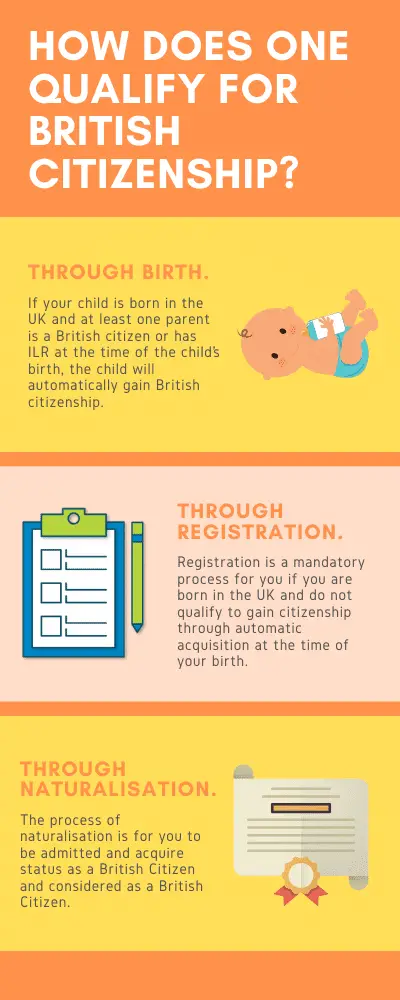
British Citizenship Through Birth
If your child is born in the UK and at least one parent is a British citizen or has ILR at the time of the child’s birth, the child will automatically gain UK citizenship. In this case, you can apply directly for a British passport for a child.
Also, children born outside the UK with at least one parent being born a British citizen can also obtain citizenship automatically.
British Citizenship Through Registration
Registration is a mandatory process for you if you are born in the UK and do not qualify to gain citizenship through automatic acquisition at the time of your birth.
This method of gaining citizenship also applies to children:
- born abroad to parents who subsequently both hold (or are applying for) British citizenship
- whose one parent holds (or is applying for) British citizenship and the other holds ILR
- or where the parents are applying for citizenship at the same time as the child.
British Citizenship Through Naturalisation
The process of naturalisation is for you to be admitted and acquire status as a British Citizen and considered as a British Citizen. This ability is given to adults who have obtained ILR or sometimes referred to as Permanent Residency. You can then apply for British citizenship after they have held permanent residency status for 12 months.
Applying for British citizenship after Indefinite Leave to Remain
If you are an adult holding a passport of any country around the globe, the only way to obtain British citizenship is via naturalisation. It is the application process you will need to follow in order to secure British citizenship, then applying for a British Passport. Before applying for British Citizenship all adult applicants for naturalisation must have:
- Indefinite Leave to Remain (ILR) if you hold a non-European passport or
- EEA Permanent Residence (PR)/Settled Status if you are a European national of a member state of the European Union.
Naturalisation can also depend on your marital status during the application process. If you are married to a British national and are applying for a British passport after Indefinite Leave to Remain, your route to a British Passport can be faster, as you can apply for naturalisation immediately after securing their ILR (for non-European passport holders) or PR (for European passport holders), or fulfilling the Settled Status (living in the UK for the certain period of time required by the law).
How fast naturalisation process will be depends on your marital status during the application process. If you have Indefinite Leave to Remain and you are married to a British national, your route to a British Passport will be much faster – you can apply for naturalisation immediately. The same applies for European passport holders who have PR or for those living in the UK for the certain period of time (required by the law) who fulfilled the Settled Status.
If you are not married to a British national when applying for a British passport after Indefinite Leave to Remain via naturalisation, you must wait for a minimum of 12-months on ILR, PR or Settled Status before you are able to apply for a British passport.
To get a British passport after Indefinite Leave to Remain, you need to get British citizenship first. Once you’ve submitted an application for British citizenship, there are some conditions you need to fill.

Case 1: Not Married to a British National
If you are applying for British citizenship after Indefinite Leave to Remain and are not married to a British citizen, you can do that if you meet the below criteria:
- You are 18 years or older
- You have lived in the UK continuously for the past 5 years
- You have met the Knowledge of Language and Life (KoLL) requirements. You should usually have passed this for your ILR application.
- You have been on Indefinite Leave to Remain or have “settled status” (restriction-free) for at least the last 12 months
- Your behavior is good (no criminal record, filling required obligations like paying taxes, etc.)
- You haven’t left the UK for more than 450 days in total in the last 5 years and have not left the UK for more than 90 days in total in the last 12 months before applying for British citizenship.
Case 2: Married to a British National
If you have lived in the UK for more than 3 years and have been married or in a civil partnership with a British citizen, you can apply for British citizenship immediately when Indefinite Leave to Remain (ILR) is being granted.
If this situation applies to you, here are eligibility requirements you need to fulfil before applying are:
- You have lived in the UK continuously for at least 3 years
- You have not broken any immigration laws during your stay in the UK
- You have spent no more than 270 days in total outside the UK in the last 3 years
- You have spent no more than 90 days in total outside the UK in the last 12 months
- You have met the Knowledge of Language and Life (KoLL) requirements
Case 3: British Citizenship for EEA nationals or Swiss citizens
If you are a citizen of the European Economic Area (EEA) or a Swiss national, you can also apply for a British passport.
In order to qualify, you will need to meet below requirements before applying:
- You have lived in the UK for at least 5 years as an EU national exercising your Treaty rights
- You have applied for and secured an EEA Permanent Residence visa or settled status (for those married to a British citizen)
- You have permanent residence or settled status in the UK for at least 12 months (for those not married to a British citizen)
- You have spent no more than 450 days in total outside the UK during the last 5 years
- You have spent no more than 90 days in total outside the UK in the last 12 months before applying
- You have not broken any immigration laws during your stay in the UK
- You have met the Knowledge of Language and Life (KoLL) requirements
Would You Pass The British Citizenship Test If You Had To Take It Today?
The “Life in the UK” test is quite easy to complete… If you know a bit about the UK. There are nuances like “who is the patron saint Ireland?”. We have therefore developed the real life in the UK test for you to try out for free.
You will need 75% to pass the test and it has been developed for our clients, and you, to take the test without the pressure of having not needed to pay for it first. The questions are genuine Life in the UK practice questions. If you pass it three times in a row, you should be ready to take the official test too.
Test yourself and then ask your friends to do the test and compare who got better marks on the scoreboard.
Applying for British Citizenship for Your Children
In case your children are born inside or outside the UK before you were granted Indefinite Leave to Remain, you can’t include them in your own application for citizenship. You will need to submit a new application for them.
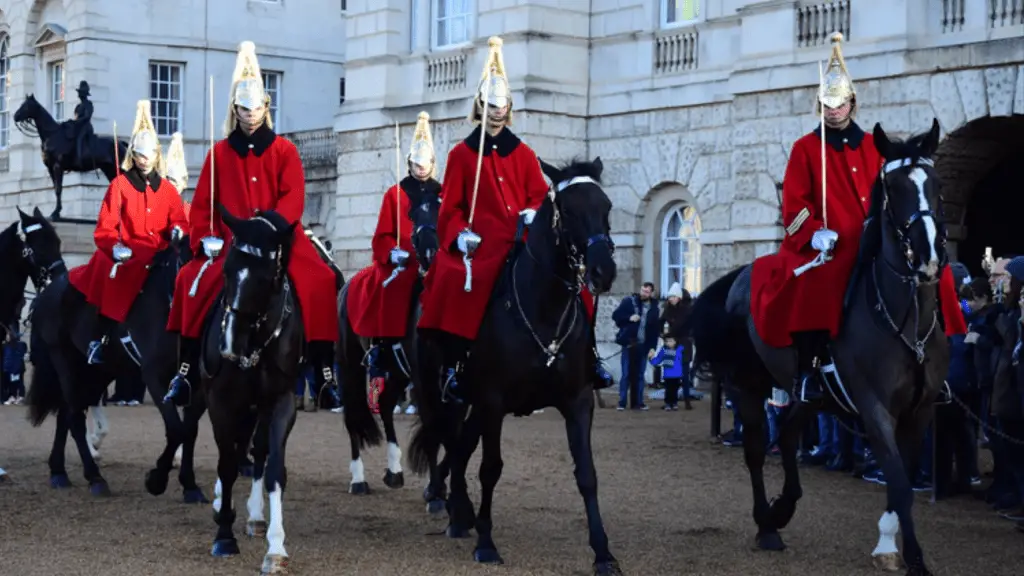
What is the Process of Applying for British Citizenship?
The usual citizenship application process requires you to fill in form AN for adults, or form MN1 for children with the requested data and send in the application to the Home Office. Alternatively, you can apply online for British Citizenship and have the application made digitally. If after checking all data your application is approved, you must attend a ceremony held at your local council, during which an oath of allegiance and a pledge is made to promise to respect the rights, freedoms, and laws of the UK. You will receive your citizenship certificate at the end of the ceremony.
The local council office that you choose will be made during your application process. You can choose a location close to where you live or choose a more convenient location. You will be permitted to take up to two friends or family with you for the ceremony. It is highly likely the ceremony will be presided over by your local Mayor.
Have in mind that it can take around 6 months to get a decision, but depending on the case, for some applications, it can take longer. If you need to provide any additional documents or information, you will be contacted. Good thing is that British citizenship is the only application you can make to the Home Office where you can travel while a decision on the application is pending.
How much does Naturalisation or Registration cost?
If you are applying for a British passport after Indefinite Leave to Remain, the cost for application is £1,330 (£1,012 for a child) as well as the passport fee of £95 for using the paper form.
You must also pay £19.20 to have your biometric information (fingerprints and a photo) taken. If your child turns 18 during the application process, you must also pay £80 for your child’s citizenship ceremony. The above fee excludes the fees of using an agency or immigration law firm like IaM.
Keeping British citizenship application refusals in mind
Under British nationality law, authorities have the right to refuse your application even if you’re applying for citizenship to get a British passport after Indefinite Leave to Remain and appear to meet the legal requirements for citizenship.
You will not have the right of appeal and no money that you have used for paying for the application will be returned to you. The refusal can also make a future application much more complex or even impossible in certain circumstances.
For British citizenship, you will have the ability to ask for a reconsideration of your application. This is an administrative review process where a senior or co-decision maker reviews a decision by one of their colleagues. Such appeals are hard to overturn unless the caseworker has made a glaring error in applying the rules.
Getting professionals to help you with the whole process is therefore very useful because it will ensure that your application meets all applicable legal requirements. Contact us to schedule a free consultation and we will be glad to give you information for a successful application process.
How long does a British citizenship application take to be decided?
Your Citizenship application is advertised by the Home Office to take an average of six months. But in practice, this depends mainly on three factors:
- How backlogged, or busy, are the Home Office?: If the Home Office is overloaded by applications, then you will expect them to take longer to make a decision. It is not unheard of for the Home Office to be overworked and with many backlogs. But this is both historic and current.
You still have to remember that the Home Office are a huge government department and they are always recruiting and expect a high staff turnover. As a result, we tend to see staff continuously being trained.It is therefore to be expected that they handle a lot of applications and also have targets. Therefore, in this regards, delays in Home Office processing is not the major factor in delays as this is to be expected and is calculated for in their processing times.
- Are there any exceptional circumstances meriting a faster turn-around? There is no guidance or routes to get your decision granted in a faster period than advertised. But there is scope for a minority of circumstances that merit exceptional circumstances.
You will need to reach out to explain to the Home Office why a decision merits a faster turnaround. You should bear in mind that you will still be able to travel and retain your current passport whilst a decision is on-going. Therefore, a reason for a faster turnaround should be exceptional. - The practical processing time: We generally see applications decided within three months and even faster. A minority of applications go through the full six months processing time and an even smaller minority take even longer. The faster we have seen a decision was just over 2 weeks.
The reason we see a quick decision-making process is thought to be the collation and preparation of applications. In this regards, it pays off to give the decision-maker exactly what they want, and in the format they want in order for them to make a decision quickly. This is where experience in making applications come into play. We see it beneficial to be using a firm such as IaM in order to be able to provide the correct documents in the correct format for your application.

Applying for a British Passport after Indefinite Leave to Remain
When you become a British citizen, you will be able to apply for your first adult UK passport.
Since you were born outside the UK what documents you need to provide depends on your circumstances. All documents must be originals and if they are not in English or Welsh, they have to be officially translated into one of these languages.
Applying for a British passport after Indefinite Leave to Remain can be done:
- online, or
- With a paper form
You can fill the application on your own and if you need any help, our team will come back to you to help you with the Naturalisation application preparation service and confirm that your UK Passport application is 100% correct, with no mistakes or missing information. We will be happy to assist you and guide you through the whole process and ensure that it will run smoothly and be as simple and easy as it can be for you.
Applying Online
If you have selected to apply for a British Passport online, get ready before you hit the application button. You will need the following information and documentation:

Step 1: Filling the application
- A digital photo of you (you can do it via mobile phone or any other device that takes digital photos, or you can ask someone to take you a photo and send it to you)
- a credit or debit card for payment
The cost is £75.50 plus any British passport assistance fee, and it can take up to 6 weeks to receive your passport in the UK. The fee is more for applications made outside the UK.
Step 2: Confirmation of your identity
After you have paid and submitted your application, you will need to find someone who knows you to confirm your identity. This person will receive all instructions via email, and all confirm your identity online.
Step 3: Sending documents
Depending on the circumstances you may be asked to send additional documents for applying for a British passport after Indefinite Leave to Remain. You will receive an email explaining what documents you need to send and where to send them.
Step 4: Interview
It is not always the case, but after you apply, there is a possibility that you will be asked to go to an interview to confirm all data.
Applying With a Paper Form
If you have selected to apply for a British Passport with a paper form, get these things ready.
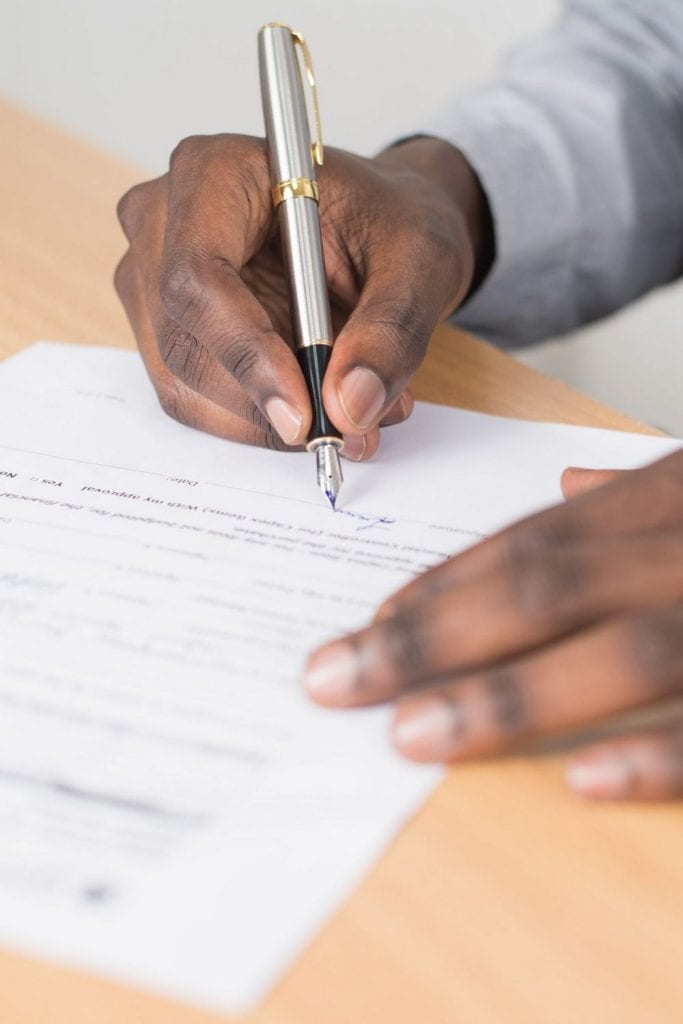
Step 1: Filling the application
- 2 filled application forms (you can find them at the Passport Adviceline or at the Post Office or you can request that they are sent to you for an additional cost of £9.75 plus postage and packaging.
- 2 passport size photos
Your passport will be ready in approximately 6 weeks.
Step 2: Confirmation of your identity
You will need to find someone who knows you to confirm your identity. This person will have to fill section 10 in the application form and sign and date one of your photos.
Step 3: Sending documents
Depending on the circumstances for applying for a British passport after Indefinite Leave to Remain, you may be asked to send supporting documents.
When you gather all things that are needed (application form, documents, and photos), there are 2 ways to send them:
- you can post them using the pre-printed envelope that comes with the form
- you can take them to the Post Office and use special service for passport application sending called Passport Check and Send service
- Use a service like IaM’s guaranteed service.
Step 4: Interview
It's not always the case, but after you apply, there is a possibility that you will be asked to go to an interview to confirm your identity.
Getting Your British Passport After Indefinite Leave to Remain
If everything goes well, you will receive your passport by courier. Remember, there are some circumstances where your application can be refused, so be very careful when you fill the application and send supporting documents. Also, passports belong to the government and they can be cancelled or withdrawn at any time.

British Nationality & Passport FAQs
How many days am I allowed to stay outside the UK for my application for Citizenship to be successful?
For your application, you should not have been out of the UK for more than 450 days in the past 5 years for the 5-year route and 270 for the 3-year route. You must also not have spent more than 90 days outside the UK in the last 12 months.
Additionally, you should have been physically present 12 months ago at the time of your application.
Can I lose my citizenship if I stay outside the UK for more than 2 years?
No. the 2-year rule only applies when you only have ILR/permanent residency. Once you are British, you can only lose that status by renouncing your citizenship or having it withdrawn for exceptional circumstances.
How long do I have to wait for British Citizenship after obtaining ILR or Settled status?
You only need to wait 1 year if you are not married to a British Citizen. If you are, you do not need to wait to apply.
What is the “Good Character Requirement” for British Citizenship?
The Home office have the right to refuse your application if it is considered that you are not of good character. There are a few guidelines, such as being a terrorist, war criminal etc. But beware, the Home Office have also deemed bad character for minor infringements such as traffic violations. So if you are not sure, get in touch to get advice on this requirement.
Who can be my referee for my British Citizenship application?
Generally, you need two referees. Both should be known to you in a personal capacity, so your immigration lawyer or advisor representing you cannot be your referee. At least one should be a British citizen and the second should be a professional, like a minister of religion, school teacher etc.
How fast can I get my British passport?
Your naturalisation application should usually be decided within six months, or earlier. thereafter, it should usually not take you longer than 4 weeks to get your British passport.
Will the government retain my passport during the decision making process?
No. You will retain your current passport whilst your application is under consideration.
Can I travel whilst my application is under consideration?
Yes. After submitting your British citizenship application, you can leave the Uk to travel as you please.
If you need any help when applying for a British passport after Indefinite Leave to Remain, contact us or schedule a consultation and we will support you in every step.



